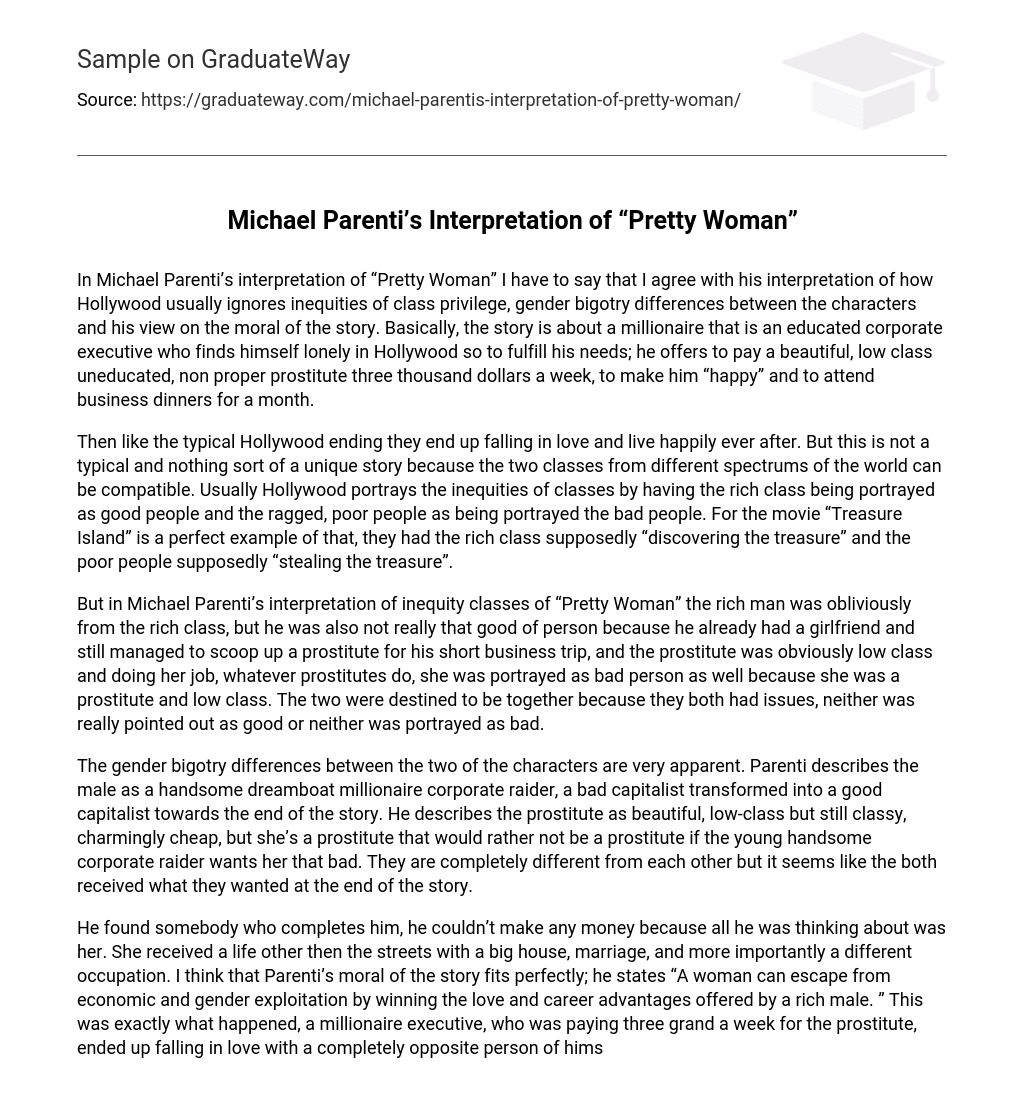In Michael Parenti’s analysis of “Pretty Woman,” I concur with his perspective on Hollywood’s tendency to overlook issues of class privilege, gender discrimination, and differences among characters, as well as his interpretation of the story’s moral. Broadly speaking, the plot revolves around a wealthy corporate executive who is intellectually inclined but suffers from loneliness in Hollywood. To address this, he proposes an arrangement whereby he pays a gorgeous yet socioeconomically disadvantaged and uneducated sex worker three thousand dollars per week. The purpose is to satisfy his emotional needs, incongruously overlapped with her participation in business dinners for a month.
Like a typical Hollywood ending, they ultimately fall in love and live happily ever after. However, this story is far from typical as it showcases a unique dynamic between two classes from different spectrums. In Hollywood, it is common to portray the rich class as virtuous individuals while painting the poor as villains. “Treasure Island” exemplifies this concept perfectly, with the wealthy class supposedly “discovering the treasure” and the impoverished portrayed as “stealing the treasure”.
According to Michael Parenti, the analysis of social inequality in the film “Pretty Woman” suggests that the wealthy man belonged to the upper class, but was not morally upright as he already had a girlfriend and still engaged with a prostitute during his brief business trip. The prostitute, who belonged to a lower social class and was depicted as someone performing her profession, also had negative characterizations due to her occupation and social status. Both characters were inevitably drawn together because of their personal issues, without a clear distinction of being either good or bad.
The gender differences in bigotry between the two characters are clearly shown. Parenti portrays the male as an attractive dreamboat millionaire corporate raider. He starts off as a bad capitalist but becomes a good capitalist by the end of the story. The prostitute is described as beautiful and low-class, yet still elegant in her own way. She is charmingly affordable but would prefer not to be a prostitute if the young, handsome corporate raider desires her so much. Despite their stark differences, it appears that both characters ultimately achieve what they desired by the end of the story.
In finding someone who completes him, he no longer focused on making money as all he could think about was her. She went from living on the streets to having a luxurious house, getting married, and most importantly, having a different occupation. Parenti’s moral of the story is applicable here – he asserts that “A woman can escape from economic and gender exploitation by winning the love and career advantages offered by a rich male.” This is precisely what occurred; a millionaire executive who paid three thousand dollars per week for the services of a prostitute ultimately fell in love with someone who was completely his opposite.
If a low class prostitute can benefit and survive by being in a relationship with a wealthy man, then why shouldn’t the prostitute aim to earn his love and improve her life beyond her wildest dreams? This exceptional narrative stands apart from typical Hollywood tales. I concur with Michael Parenti’s interpretations of the story as they align with my own thoughts if I had watched the movie. While it may not convey the most ideal moral for girls and no girl should engage in such behavior, sometimes one must do what is necessary to better oneself.





